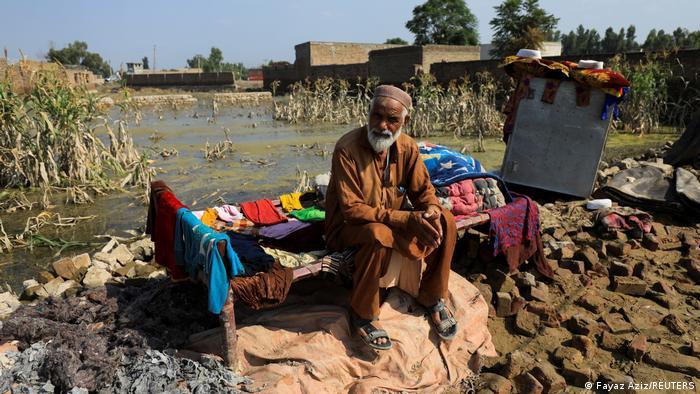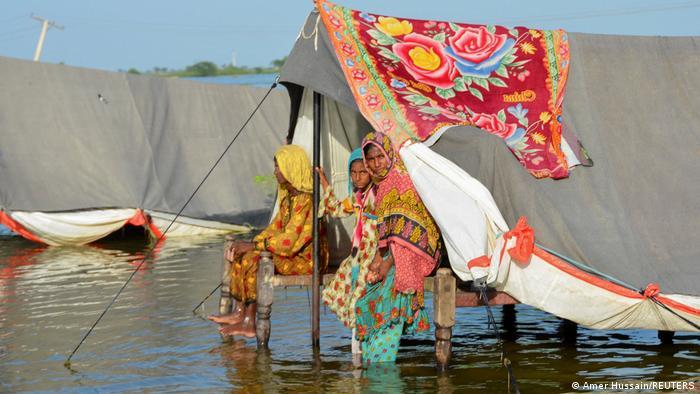Pakistan: Is International Aid Reaching Flood Victims?

Authorities say they are doing their best to help the flood victims
UN Secretary-General Antonio Guterres has been at the forefront of an international effort to help the flood victims in Pakistan.
Guterres has actively supported the $160 million (just under €160 million) UN "Flash Appeal" to fund Pakistan's Flood Response Plan. When he visits the South Asian country on Friday, he is likely to appeal for more aid.
"The secretary-general will travel to areas most impacted by the floods. He will interact with displaced families and first responders in the field, and oversee UN's humanitarian response work in support of the government's rescue and relief efforts for millions of affected people," Pakistan's Foreign Ministry said in a statement.
It added that Guterres' visit "will contribute toward enhancing commensurate and coordinated international response to the humanitarian and other needs of the 33 million affected Pakistanis."
At least 1,300 people have been killed and millions displaced amid months of torrential rains in Pakistan. About one-third of the country has been flooded.
Although the UN and many foreign governments have pledged hundreds of millions in aid for Pakistan, Islamabad estimates it will cost at least $10 billion to rebuild everything that has been destroyed.
International aid pouring in
But the most pressing issue is to help people whose lives have been devastated by these floods.
The European Union has provided €350,000 in immediate assistance to people most affected by the climate catastrophe, especially in Jhal Magsi and Lasbella districts in the western Balochistan province.
The World Health Organization (WHO) has released $10 million from its emergency fund to support the Muslim-majority country. The World Bank announced $350 million, the World Food Program $110 million, Japan $7 million, the Asian Development Bank $20 million, the UK $46.6 million and the US $31.1 million.
Pakistani Prime minister Shehbaz Sharif last week tweeted that the first tranche of aid from the United Arab Emirates had already reached the country.
Other countries and international non-governmental organizations are also assisting Pakistan in these difficult times.
A source at the Ministry of Economic Affairs told DW on condition of anonymity that Pakistan has already received 40% of the UN "Flash Appeal" aid in the form of relief goods and assistance.
"The World Bank has repurposed some of its projects so that it could use them to support the ongoing relief efforts," he said.
People still waiting for aid
Although a substantial amount of aid has arrived in Pakistan, prominent social worker Faisal Edhi said that only 10% of the flood victims have received any assistance so far.
According to UNICEF, relief and rescue operations are still extremely difficult to carry out given the scale of destruction in many parts of the country.
Muhammad Nawaz Khoso, resident of the Nasirabad district in Balochistan, told DW that the government does not have the capacity to help them.
"My house in the village has been flooded for days now. Rising water levels forced me to leave the village with my family members," he said, adding that he and his family have been without any help for days.
Another flood victim from the southern Sindh province tells the same story. Saleem Magsi told DW that hundreds of people from different parts of the province have camped near the highway.
"Many remote areas in the province are still under water and authorities have not rescued the residents there. We have not received medicines, food and tents," he said.
Shazia Abid, a lawmaker from the Punjab province, says that women have been affected by floods more than others. "Many relief camps do not have toilet facilities, what to say about medicines, food and other facilities," she told DW, adding that thousands of people were camping on roads and had to walk three to four kilometers to safer areas.

Women have been severely affected by the floods, as toilets and other amenities are lacking
Government 'doing its best'
Rehmat Saleh, a former health minister in Balochistan province, who recently visited a number of floods affected areas, told DW that it is difficult to help flood victims without the help from nongovernmental organizations. "But the government has barred them from operating in the country on the pretext of security," he said.
Authorities say they are doing their best to help the flood victims. According to the federal government, it has introduced a scheme to deliver cash aid to families affected by floods.
Muhammad Younas, an official at the Provincial Disaster Management Authority, Balochistan, told DW that foreign aid was being distributed to people through the National Disaster Management Authority (NDMA).
"The NDMA delivers aid to provincial disaster management authorities, who then pass it to the district management and other administrative units."
"International NGOs have their own local partners who they give their aid to. They have their own mechanism and ways of assessing the damages and victims' needs. They, however, must get permission from the government to work in a particular area," Younas added.
Difficult days ahead
Although water is receding in some areas, the ordeal of the flood victims is far from over. There are reports of disease outbreaks in many flood-affected areas, and a shortage of medical facilities.
Al Khidmat relief organization estimates that at least five million people are at risk of contracting various diseases.
UNICEF fears that over three million children could contract waterborne diseases in the coming days. According to the UN body, at least 18,000 schools have been damaged or destroyed by the floods.
Muhammad Jalal Uddin from the ruling coalition in Islamabad says that Pakistan is hoping to receive more aid from the international community.
Renowned economist Kaiser Bengali, however, believes it would not be easy for the Pakistani government to get a large amount of aid. "One, there is a donor fatigue. Two, Pakistan needs to slash non-development expenditure, including the non-combatant defense budget, ration petrol and ban non-essential imports to generate more money that will be required for flood rehabilitation," he said.
Edited by: Shamil Shams
Get the latest reports & analysis with people's perspective on Protests, movements & deep analytical videos, discussions of the current affairs in your Telegram app. Subscribe to NewsClick's Telegram channel & get Real-Time updates on stories, as they get published on our website.
























